Nov 25, 2013
A year ago, 112 garment workers were killed in a fire at the Tazreen Fashions Ltd. factory—and a thousand others were injured in the scramble to escape a building with no fire escapes and firmly barred windows.
On April 24, 2012, more than 1,200 garment workers were killed when the multistory Rana Plaza building pancaked in, crushing workers in five factories located in the building.
If these workers, nearly all young women, had been in unions, it’s likely these tragedies could have been prevented.
These disasters—and many more smaller, little-reported workplace tragedies—are why Bangladeshi garment workers are literally organizing for their lives.
Because of the international attention these disasters sparked, workers now can register their unions.
But they are facing intense employer resistance—including physical attacks, threats and termination—and some of these young leaders could benefit from hearing from experienced trade unionists that the fight for a union is worth the struggle.
The workers would be strengthened by international support, knowing they are not alone. To send them a messae of solidarity, please use the sample letter below or write one of your own. Send the completed letter to [email protected] and let these workers know that you stand with them. The Solidarity Center, which has worked for 20 years to help Bangladeshi garment workers gain a voice on the job, will translate and distribute the letter to its union partners, and your message will reach the workers who need to hear it the most.
_____________________________________________________________
SAMPLE LETTER
Dear Sisters and Brothers:
As fellow trade unionists, we are writing in solidarity to commend your bravery and to encourage you to stand together in the face of employer resistance.
Since the tragic Tazreen factory fire in November 2012, you have made great progress in your efforts to organize. Even though ready-made-garment factory owners and the Bangladesh government have placed hurdles and difficulties in your path, you have persevered.
As union members, we know what this struggle is like. We know how hard employers fight to keep the union out, going as far as harassing and firing activists and leaders. Employers will try and turn you against one another.
We know from experience the struggle is worth the difficult journey—the union is the best way for workers to stand up for their rights.
Keep up your amazing effort and find strength in each other. Do not give up! We are with you!
In Solidarity,
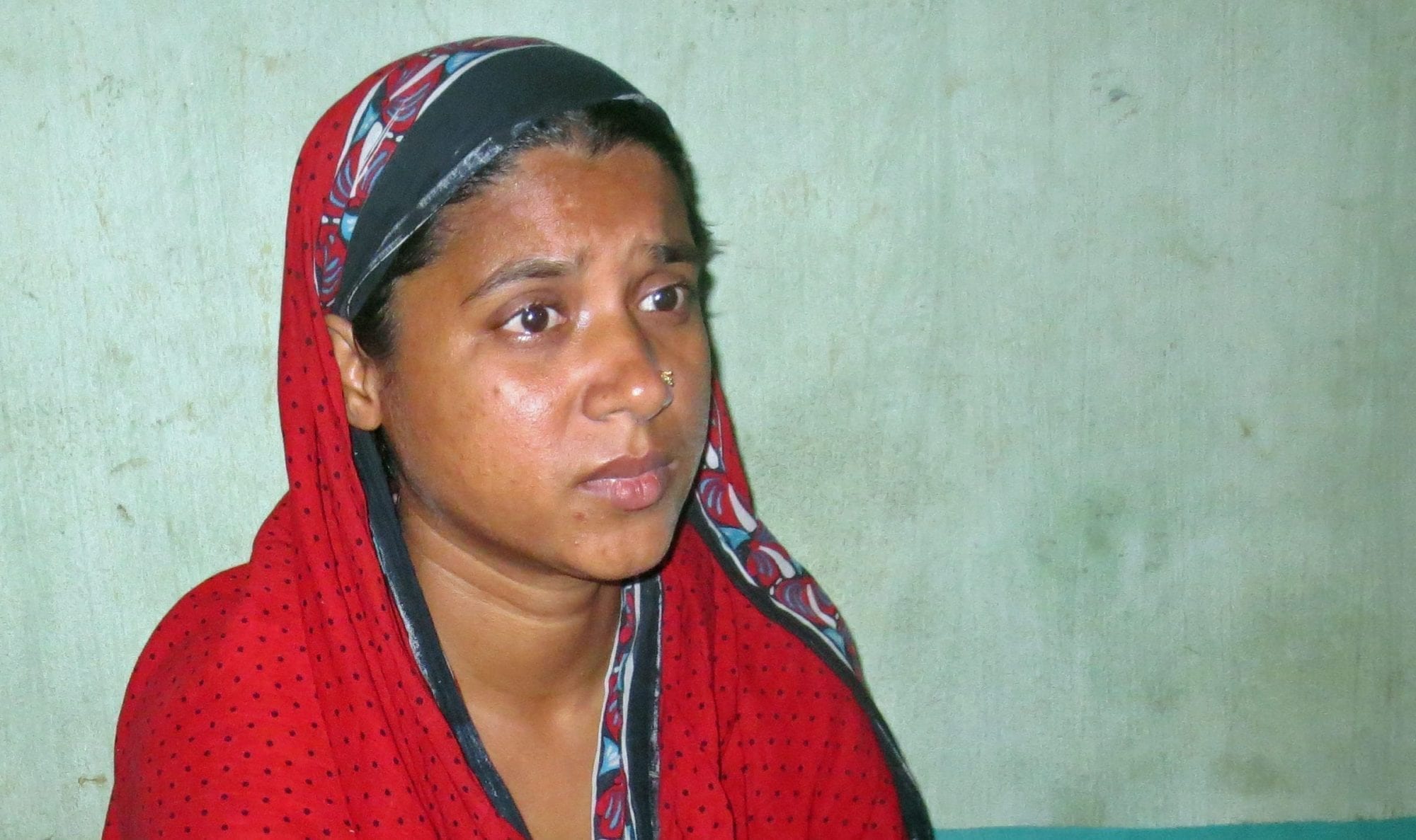
Nov 25, 2013
Tahera, 23, has been so ill from the injuries she sustained in the November 24, 2012, Tazreen Fashions factory fire, her husband Roshidul has had to quit his job to take care of her. Now, they have no income to support their family of four.
The blaze, which spread through the multistory factory outside Dhaka, the Bangladesh capital, killed 112 workers and injured thousands more. Like nearly all Tazreen survivors, Tahera jumped out of a window to escape the flames because the stairwells were locked.
“I have severe pain in my whole body,” Tahera said, crying. “I don’t feel any strength in my body now. Although one year has been passed, I can’t sleep properly because of fear. I try to forget the memory of the Tazreen’s fire accident, but I can’t. Sometimes it seems to me that I will not live any longer.”
Her physical injuries are severe, as are her mental and psychological suffering. As panicked workers broke windows and ripped open air shafts to escape the building, the electricity went out while the blaze spread. Tahera fell in the melee, and her head and chest were trampled.
“Following the fire accident, Tahera behaved abnormally,” says Roshidul. “She used to try to leave the house all the time, even at night. I used to sleep in front of the door of house so that she could not wander out. Following the accident at Rana Plaza, she used to cry loudly watching those scenes on television and, even one year after the accident, whenever my wife watches any scene of fire on television she becomes so scared she cries.” In the Rana Plaza disaster, more than 1,200 garment workers were killed April 24, 2013, after the multistory building housing five garment factories near Dhaka collapsed.
“Even now, I can’t remember any one’s name, sometimes nothing,” Tahera said.
Tahera and her husband are borrowing from shopkeepers to survive and do not know how they will pay rent for their home in Savar, near Dhaka. “Our present financial condition is very poor, which it was not before the accident,” said Tahera. They have a 14-year-old daughter and 2-year-old son, but Tahera says, “I can’t pay the tuition fees of my daughter, I can’t buy milk for my little son and I can’t remember anything.”
Roshidul said nearly all of the money they received for Tahera’s injuries from the Bangladesh Garment Manufacturing and Exporting Association (BGMEA) was spent on her medical care. He also used up his savings for her treatment. Now, there is no money left. “I haven’t been able to take her to the doctor or buy medicine for her treatment for the last two months,” he said. Tahera and her husband say families like theirs have been forgotten.
Tahera came to Dhaka nine years ago, hoping to better her life. Now, all she wants is enough support to get medical treatment and ensure her family has a place to live and food to eat.
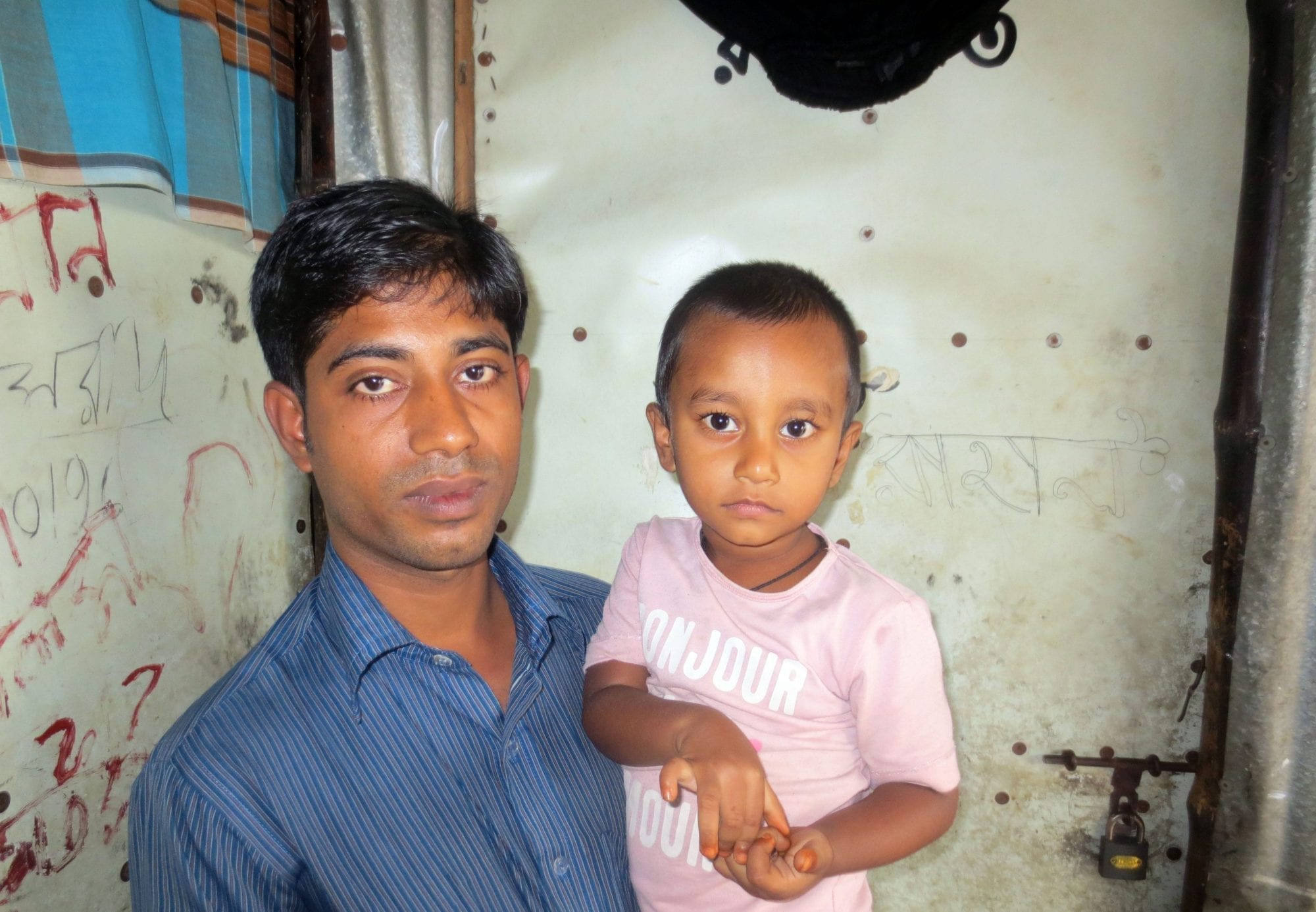
Nov 22, 2013
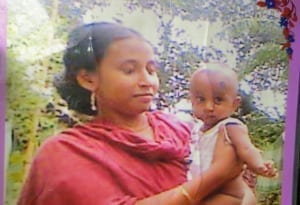
Mahfuza Khatun, 22, died in the Tazreen Fashions factory fire. Photo courtesy Md. Abdul
To mark the one-year anniversary of the deadly Tazreen Fashions factory fire in Bangladesh, the Solidarity Center is highlighting stories of survivors and their families.
Mahfuza Khatun, 22, was a sewing machine operator on the fourth floor of the Tazreen Fashions garment factory when the multistory building went up in flames just outside Dhaka, the Bangladesh capital. Some 112 garment workers were killed in the November 24, 2012, tragedy, and Mahfuza was among them, although her body has never been found.
“I did everything to find her dead body. Unfortunately, all my efforts were in vain,” said Md. Abdul, Mahfuza’s husband.
Abdul and his 2-year-old son live with his parents and Abdul’s three siblings. As the eldest son, he must provide nearly all the financial support for his extended family.
“The family used to be supported by the income of me and my wife,” said Abdul, also a garment worker. Now, his income alone cannot cover all the family’s costs. As a result, he said, “My son often becomes sick, and I cannot take him to the doctor for lack of money.”
Mahfuza came to Dhaka in 2009 with her husband. “Despite her desire to continue to study, she started working to financially support my family. Until the last day of her job, she never spent a single penny outside of this family,” he said.
“On November 24, 2012, it was lunch time when I talked to her for the last time. In the evening, I heard about the fire at Tazreen Fashions and rushed to see my wife. I looked for my beloved wife in every nook and corner but could not find a trace of her.” His sister-in-law also was burned to death at Tazreen. Workers who escaped the blaze did so by jumping out windows because nearly all the stairwell doors were locked.
Neither Abdul nor his son have received any compensation on behalf of Mahfuza—with the exception of $25.64 he got from the Bangladesh Garment Manufacturers and Exporters Association. He spent nearly all his savings looking for her body. Property he owned near Tazreen was destroyed in the blaze and now, Abdul says, “I do not have anything for the future of my son.”
Survivors and the families of those injured or killed are still suffering a year after the Tazreen blaze, and no one has stepped up to help them survive the devastating financial and emotional loss. “I urge the government to behave responsibly and arrange security for every single citizen,” Abdul said. He seeks “enough compensation from BGMEA and the factory owner so that I can survive and educate my son.”
Survival is one of many struggles Abdul faces. “What will I say when my son asks about his mother?” he asked. “I will not even be able to show her grave to her son.”
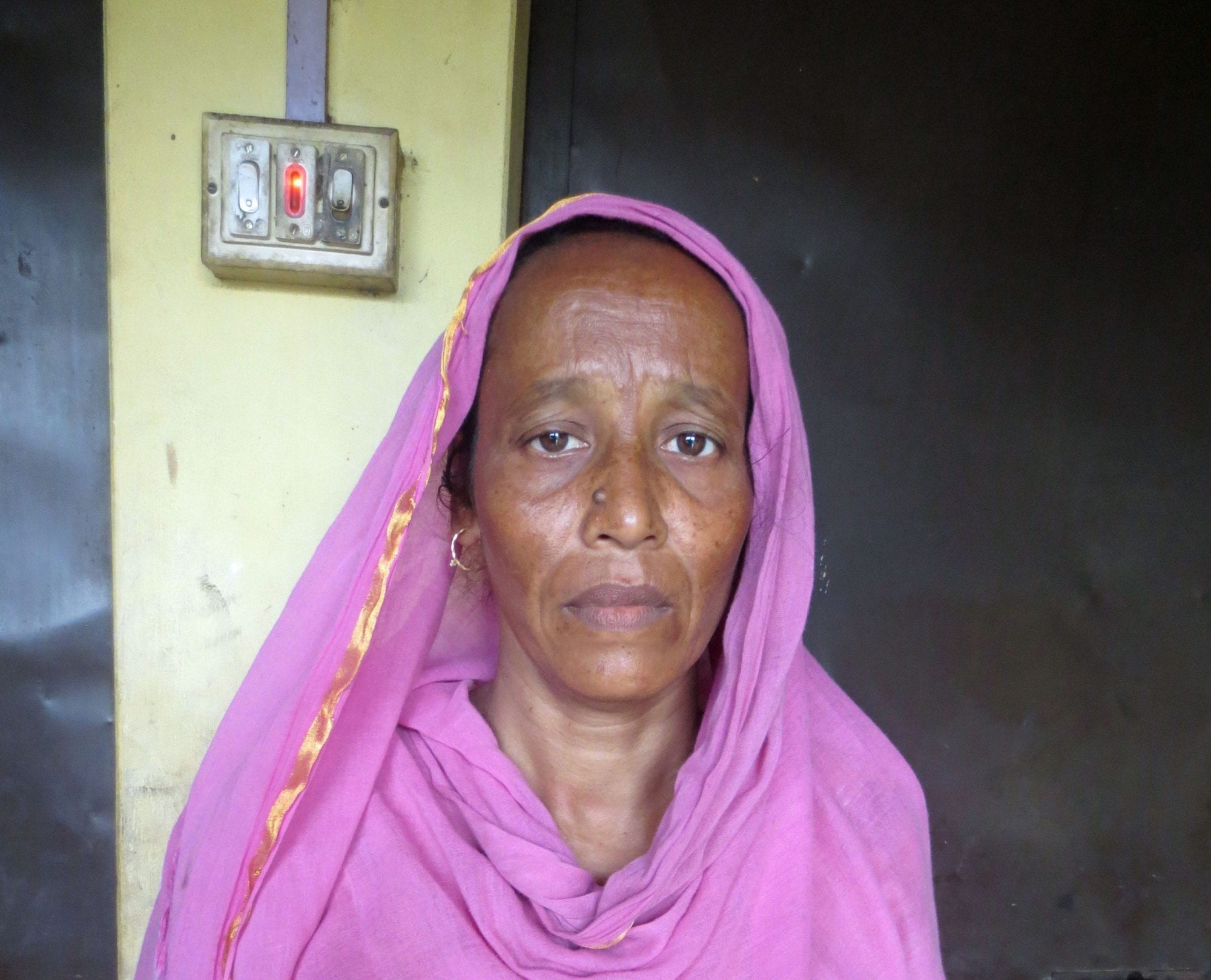
Nov 22, 2013
Raoshonara is destitute. “I have no other option but begging to survive,” she said, and burst into tears. The 35-year-old garment worker is unable to support herself or her family after suffering severe injuries escaping the factory fire that decimated Tazreen Fashions where she worked as a finishing operator. Raoshonara, like her co-workers at the multistory factory, was forced to jump out of a window because the building had no fire escapes. Some 112 workers died in the November 24, 2012, tragedy at Tazreen, located just outside Dhaka, the Bangladesh capital.
Unable to work because of disability and pain—“I cannot even sit for more than 30 minutes at a stretch,” she said—she sent her children back to her home village because she cannot support them. “I am not even able to buy food for them,” she said. Raoshonara is living with her sister, who buys her food and medicine. But that assistance will soon end. Raoshonara says her sister “won’t be able to continue her support for very long because she has to maintain her family.”
Raoshonara paid her initial medical bills with the compensation she received from the Bangladesh Garments Manufacturing and Exporting Association (BGMEA) and the private, Jesuit-run organization, Caritas. But she needs far more medical care and neither the factory owner, nor the brands, nor the government is offering Tazreen victims any assistance.
Her backbone is damaged from falling three stories. She suffers severe pain from a leg fractured in the fall. Another leg was sliced by a machine in the melee before she jumped out the window, as panicked workers stumbled in the dark trying to escape. And like nearly all Tazreen survivors, she is psychologically traumatized. “I get frightened when I see any big building. Fear of death always keeps me frightful and makes me cry,” she said.
Raoshonara came to Dhaka in 2008 from a small village in the Jamalpur District, after she was abused by her husband who frequently demanded large amounts of money as dowry. To pay him, she sold the small property her father left her and her brothers in the village. Once in Dhaka, at Tazreen, she worked hard and planned to send her children through school. She was filled with hope for her new life.
Now, she says, she is begging just to survive.
Nov 22, 2013
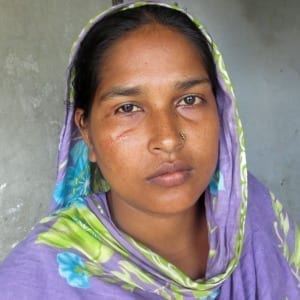
Morsheda is forced to send her son to live with relatives because she can no longer support him after being injured in the Tazreen Fashions factory fire. Credit: Solidarity Center
Morsheda could not travel to her home village in Bangladesh for the recent Eid holiday because she could not afford the trip. Her 9-year-old son, who lives in the village with his grandmother, told neighbors there that he does not have parents because if he did, they would be with him for the holiday
“You cannot imagine how very painful it is for parents to hear such words from their child,” she said.
Since sustaining severe injuries in the November 24, 2012, Tazreen Fashions garment factory fire, Morsheda, 25, has been too disabled to work. Without funds for her son’s education, she sent him to live with her relatives.
Morsheda has lost the use of her right hand, so badly damaged during her flight from the blaze that swept through the multistory factory that she can only prepare meals with the help of her sister. To get out of the factory, Morsheda, like nearly every Tazreen survivor, was forced to jump from a window to safety after she and co-workers found the stairwell exits locked. They escaped even though their manager had ordered them back to work when the fire alarm sounded. Her right eye was gashed as a result of her fall, and she still has difficulty seeing from it.
“My whole body is swollen when I wake up from sleep,” she said. “Every night I feel pain in my right leg and my waist.”
Her husband, also a garment factory worker, is not paid enough to buy the medicine she needs. “With his income, it is tough to buy medicine, to run a family, to pay for my son’s educational expenses, to pay back loans, etc.,” she said. The little money Morsheda received in compensation for her injuries was quickly spent on her medical care.
Morsheda believes that the factory owner, the brands and the government have forgotten her and the thousands of other Tazreen garment workers now too injured to support themselves and their families. Morsheda says she needs real assistance if she and her family are to survive.
Morsheda and her husband came to Dhaka, the Bangladesh capital, several years ago in search of jobs. With two incomes, the couple could pay for their son’s education. But now, out of school and missing an education, they fear their child will face a bleak future, one that likely will continue the cycle of poverty.
“Leading a better life is not only the hope of rich people but also the poor people like us,” Morsheda said, crying. “Garment owners have much money. They have the capability to run so many garment factories. They have nothing to lose. But we poor have lost everything.”





